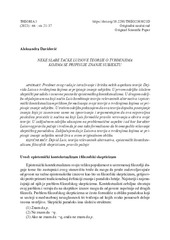Приказ основних података о документу
Neke slabe tačke Luisove teorije o tvrđenjima kojima se pripisuje znanje subjektu
Some Weak Points of Lewis’ Theory of Knowledge Ascriptions
| dc.creator | Davidović, Aleksandra | |
| dc.date.accessioned | 2023-10-08T11:01:19Z | |
| dc.date.available | 2023-10-08T11:01:19Z | |
| dc.date.issued | 2023 | |
| dc.identifier.issn | 0351-2274 | |
| dc.identifier.uri | http://reff.f.bg.ac.rs/handle/123456789/4921 | |
| dc.description.abstract | Predmet ovog rada je istraživanje i kritika nekih aspekata teorije Dejvida Luisa o tvrđenjima kojima se pripisuje znanje subjektu. U prvom odeljku izlažem skeptički paradoks i osnovne postavke epistemičkog kontekstualizma. U drugom odeljku objašnjavam na koji način Luis kombinuje teoriju relevantnih alternativa i epistemički kontekstualizam prlikom formulisanja svoje teorije o tvrđenjima kojima se pripisuje znanje subjektu. U trećem odeljku pokazujem da ova teorija dopušta postojanje znanja koje je zasnovano samo na ignorisanju i argumentujem da ova nepovoljna posledica proističe iz načina na koji Luis formuliše pravilo verovanja u okviru svoje teorije. U zaključnom odeljku ukazujem na problematične aspekte i ad hoc karakter Luisovog pravila pažnje i tvrdim da je ono tako formulisano da bi omogućilo rešavanje skeptičkog paradoksa. Zaključujem da je Luisova teorija o tvrđenjima kojima se pripisuje znanje subjektu neodrživa u svom originalnom obliku. | sr |
| dc.description.abstract | This paper explores and criticizes some aspects of David Lewis’ theory of knowledge ascriptions. In section one I present the sceptical paradox and the basic assumptions of epistemic contextualism. In section two I explain how Lewis combines the relevant alternatives theory with epistemic contextualism in formulating his theory of knowledge ascriptions. In section three I show that this theory allows knowledge which is based purely on ignoring and I argue that this unfavourable consequence stems from the way in which Lewis formulated the rule of belief within his theory. In the concluding section I point out the problematic aspects and ad hoc character of Lewis’ rule of attention and claim that it was thus formulated so as to be able to solve the sceptical paradox. Finally, I claim that Lewis’ theory of knowledge ascriptions is untenable in its original form. | sr |
| dc.language.iso | sr | sr |
| dc.publisher | Srpsko filozofsko društvo, Beograd | sr |
| dc.rights | openAccess | sr |
| dc.rights.uri | https://creativecommons.org/licenses/by/4.0/ | |
| dc.source | Theoria | sr |
| dc.subject | Dejvid Luis | sr |
| dc.subject | teorija relevantnih alternativa | sr |
| dc.subject | epistemički kontekstualizam | sr |
| dc.subject | filozofski skepticizam | sr |
| dc.subject | pravilo pažnje | sr |
| dc.subject | David Lewis | sr |
| dc.subject | theory of relevant alternatives | sr |
| dc.subject | epistemic contextualism | sr |
| dc.subject | philosophical scepticism | sr |
| dc.subject | the rule of attention | sr |
| dc.title | Neke slabe tačke Luisove teorije o tvrđenjima kojima se pripisuje znanje subjektu | sr |
| dc.title | Some Weak Points of Lewis’ Theory of Knowledge Ascriptions | sr |
| dc.type | article | sr |
| dc.rights.license | BY | sr |
| dc.citation.epage | 37 | |
| dc.citation.issue | 3 | |
| dc.citation.spage | 21 | |
| dc.citation.volume | 66 | |
| dc.identifier.doi | 10.2298/THEO2303021D | |
| dc.identifier.fulltext | http://reff.f.bg.ac.rs/bitstream/id/12026/bitstream_12026.pdf | |
| dc.type.version | publishedVersion | sr |

